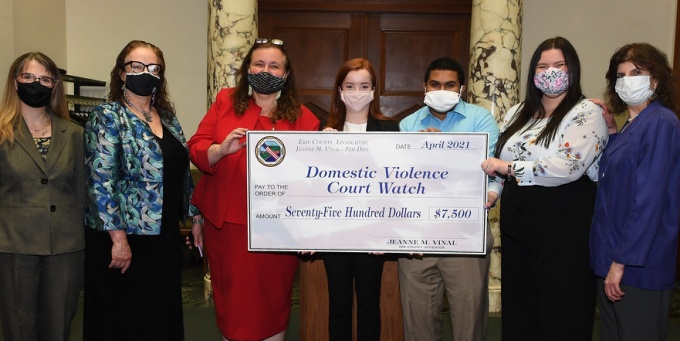
Erie County Legislator Jeanne Vinal ’89 presents a check to our Family Violence and Women’s Rights Clinic to support the development of a Domestic Violence Court Watch program in Erie County.
Family Violence Clinic expands its impact with state and county support
At a time when past pandemic restrictions have sparked an upsurge in intimate partner violence, UB School of Law’s Family Violence and Women’s Rights Clinic has received two grants that will significantly boost its capacity to protect people in peril.
The grants, one from New York State and the other from Erie County, come as the clinic prepares to celebrate the 30th anniversary of its founding, including a planned conference, next year. The state grant will support the direct aid that students provide to domestic violence victims under the supervision of Associate Clinical Professor Judith Olin, and Adjunct Instructor Kelley Omel. The county funding will help formalize efforts to establish a domestic violence court watch program to pilot in Erie County’s town and village courts.
To learn more about the clinic, please visit the Family Violence and Women's Rights Clinic website.
The $150,000 state grant was passed as a special legislative member item thanks to two area members of the Assembly, Karen McMahon ’86 (D-Amherst) and Pat Burke (D-Buffalo). $100,00 was allocated to one of the clinic’s community partners, the Family Justice Center of Erie County, a one-stop shop for people in domestic violence situations. The remaining $50,000 will directly support the work of the law school clinic.
“We’re deeply appreciative of their efforts,” Olin says of the two lawmakers. “It really means a lot. We anticipate that these funds will help us to hire additional staff and ultimately be able to represent more clients in need.”
Olin hopes that this grant will assist in enabling the clinic to hire an additional part time student attorney supervisor, making it possible for more students to participate and thus more clients to be served with such practical help as seeking orders of protection, and obtaining divorces from abusive partners.
“There are a good number of clients out there who need representation,” Olin says. “They don’t qualify for free legal services from Neighborhood Legal Services and other free civil legal services providers because they earn a little too much; or there may be a legal conflict of interest.”
And the need for representation is great: the lockdowns, isolation and economic instability of the long pandemic have only increased the violence in already unstable households. And even before the virus, the numbers locally have been dire. Olin says New York State Division of Criminal Justice Services statistics show that twice as many victims were killed by their abuser in Erie County in 2019 compared with the previous year. “So it makes sense,” she says, “to provide more funding to programs that support survivors using the legal system to end abusive relationships.”
A targeted $7,500 grant earmarked by the Erie County Legislature is expected to make possible the hiring of a coordinator for a domestic violence court watch program in the county – a project on which clinic students have long been working.
“In creating this court watch system for Erie County,” wrote newly graduated clinic student Abbi Fuhrken ’21, “all domestic violence prevention partners want to ensure our courts are trauma-informed and that victims of domestic violence are treated with respect. Research has shown that the most important factor contributing to how a litigant views the court system is not whether they ‘win or lose,’ but instead how they felt they were being treated during the process. Domestic violence can leave deep emotional scars, and we hope this program will prevent re-traumatizing a person who has experienced our court system because of domestic violence.”
Olin says students have developed a toolkit for use by citizen volunteers, who will visit the courts, observe the proceedings in domestic violence cases, and evaluate how well each court accomplishes those goals. “People don’t often think about this, but victims may walk to their car in the parking lot after a court proceeding with an abusive partner who may be very angry about what happened in court,” she says. “Sometimes courts meet at night, it could be dark. We want to make sure that there are escorts available and appropriate lighting. Court watchers will monitor whether the abusive partner is asked to remain in the courthouse so the survivor can safely get to their car and drive away.
The plan, she says, is to introduce the court watch program in town and village courts and then possibly expand it to other courts in Erie County that hear domestic violence cases. One source of volunteers for the effort is expected to be the local chapters of Zonta International, a service organization for women with which the clinic is partnering.